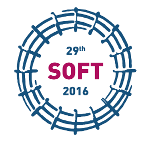Speaker
Josu Eguia
(Mechanical Engineering)
Description
The vacuum vessel of ITER is a paradigmatic example of a gargantuan system that can only be processed in-situ and from the inside. Its assembly implies performing post welding repair operations, including machining of welding seams following the internal surface of the vacuum vessel. The requirements for the machining operations are the following: accuracy +/- 0.1 mm; dynamic machining forces 3 kN; and speed up to 1.2 m/min.
In response, authors developed a new portable milling machine which was reported in SOFT2014. Now, an in-depth analysis of its capabilities is presented. More specifically, an error budget of the use of said machine is performed to estimate the accuracy of the features machined. The different error sources are clearly identified and quantified: the machine-process interaction, the inter-referencing with respect to the vacuum vessel and the geometric errors. To obtain sound estimates of the errors, both experiments and simulations have been employed.
Results show that this portable machine can perform both mid-duty milling and drilling operations in a five axis configuration. Therefore, it is not only suited for welding seam recovery, but also drilling and milling of biscuits and edge preparation. The expected results of using the machines have shown uncertainties of 0.06 mm, heavily determined by the machine-work piece inter-referencing method, which becomes the major improvement vector for further research around these in-situ machines. In terms of the process, tool deflection is the main error component and should be studied in detail. Also, thermal issues and deformations should be taken into account if the use of portable machines refers to continuous or intensive machining operations.
Co-authors
Aitzol Lamikiz
(Departamento de Ingeniería Mecánica, Universidad del País Vasco UPV/EHU, Alameda de Urquijo s/n, 48013 Bilbao, Spain)
Eneko Olabarrieta
(Mechanical Engineering, IK4-TEKNIKER, Eibar, Spain)
Josu Eguia
(Mechanical Engineering, IK4-TEKNIKER, Eibar, Spain)

